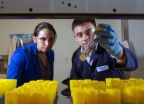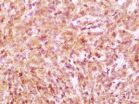(Press-News.org) EAST LANSING, MI--Since the introduction of 'Honeycrisp' apples in 1991, the variety has become a consumer favorite for its unusual texture and delicious flavor. Honeycrisp has increased in popularity with growers as well; Michigan, New York, and Washington boast significant numbers of 'Honeycrisp' orchards. As the growing area dedicated to the variety has grown, the need to find better methods for improving storage performance has become more important to growers. Because 'Honeycrisp' is very sensitive to low temperatures and can be damaged by controlled-atmosphere conditions, long-term storage of the apples can be challenging.
Carolina Contreras and Randy Beaudry from the Department of Horticulture at Michigan State University and Nihad Alsmairat from the Department of Horticulture and Crop Science at the University of Jordan published a study in HortScience that revealed some important information for apple producers. "Our work was conducted in two phases," Beaudry explained. "The first phase was designed to determine whether 'Honeycrisp' apples were susceptible to controlled-atmosphere injury, to determine the relative influence of O2 and CO2, and to identify a treatment combination that would reliably generate symptoms so that control measures could be subsequently evaluated." In the second phase, the scientists evaluated options for avoiding injury to 'Honeycrisp' during controlled-atmosphere storage. Fruit were conditioned at 3º C, 10º C, and 20º C for 5 days and then exposed to one of nine different storage treatments.
In the first experiment, 'Honeycrisp' exhibited a high sensitivity to both low oxygen and elevated CO2 levels. "We found that the controlled-atmospheres used induced injuries typical of those associated with CO2 (i.e., small brown lesions and associated lens-shaped cavities) and also larger dark brown lesions with often irregular margins," the authors said. "The extent of the injury was higher for those fruit in an atmosphere with elevated CO2 for each level of O2."
Subsequent experiments took place over 3 years, during which the researchers reproduced the controlled-atmosphere (CA) injury from the preliminary study with varied intensity. Although the researchers observed high variability between orchards and years, they found two treatments that effectively controlled the CA injury. "We found that the brown lesions in the cortex were completely suppressed by DPA application, even when the prestorage conditioning temperature was 3º C," Beaudry said. "The incidence of cavities ranged from 0.1% to 0.3% under the same DPA treatment. On the other hand, the most affected treatment was 3/3 followed by 3/0, 21/0, and 21/ 0 plus 1-MCP."
The authors noted that, while there is good progress toward determining optimal storage recommendations for 'Honeycrisp' additional studies are still warranted. "For instance, although the 7-day prestorage conditioning treatments provided some protection against the development of CA injury, shorter durations should be investigated to prevent quality loss resulting from excessive ripening, which could cause increased skin greasiness and undesirable flavor profile."
The study includes additional recommendations for handling 'Honeycrisp' in prestorage conditions.
INFORMATION:
The complete study and abstract are available on the ASHS HortScience electronic journal web site: http://hortsci.ashspublications.org/content/49/1/76.abstract
Founded in 1903, the American Society for Horticultural Science (ASHS) is the largest organization dedicated to advancing all facets of horticultural research, education, and application. More information at ashs.org
Prestorage conditioning, diphenylamine improve condition of 'honeycrisp' apple
Scientists determine methods for improving resistance to controlled-atmosphere-related injury
2014-03-26
ELSE PRESS RELEASES FROM THIS DATE:
Nitrogen source determined significant for inflorescence development in Phalaenopsis
2014-03-26
TAIPEI, TAIWAN--The Phalaenopsis orchid, also known as the moth orchid, is the most important pot flower in terms of market value in the world's major floriculture markets. Because nitrogen significantly affects the growth and flowering of Phalaenopsis, nitrogen needs during flowering are of particular interest to growers. Researchers Hadi Susilo, Ying-Chun Peng, and Yao-Chien Alex Chang from the Department of Horticulture and Landscape Architecture at National Taiwan University published a study in the Journal of the American Society for Horticultural Science that determined ...
Engineered bacteria produce biofuel alternative for high-energy rocket fuel
2014-03-26
Researchers at the Georgia Institute of Technology and the Joint BioEnergy Institute have engineered a bacterium to synthesize pinene, a hydrocarbon produced by trees that could potentially replace high-energy fuels, such as JP-10, in missiles and other aerospace applications. With improvements in process efficiency, the biofuel could supplement limited supplies of petroleum-based JP-10, and might also facilitate development of a new generation of more powerful engines.
By inserting enzymes from trees into the bacterium, first author and Georgia Tech graduate student ...
Ancient sea creatures filtered food like modern whales
2014-03-26
The animals lived 520 million years ago during the Early Cambrian, a period known as the 'Cambrian Explosion' in which all the major animal groups and complex ecosystems suddenly appeared. Tamisiocaris belongs to a group of animals called anomalocarids, a type of early arthropod that included the largest and some of the most iconic animals of the Cambrian period. They swam using flaps down either side of the body and had large appendages in front of their mouths that they most likely used to capture larger prey, such as trilobites.
However, the newly discovered fossils ...
First ring system around asteroid
2014-03-26
The rings of Saturn are one of the most spectacular sights in the sky, and less prominent rings have also been found around the other giant planets. Despite many careful searches, no rings had been found around smaller objects orbiting the Sun in the Solar System. Now observations of the distant minor planet [1] (10199) Chariklo [2] as it passed in front of a star have shown that this object too is surrounded by two fine rings.
"We weren't looking for a ring and didn't think small bodies like Chariklo had them at all, so the discovery — and the amazing amountof detail ...
Gut metabolism changes -- not stomach size -- linked to success of vertical sleeve gastrectomy
2014-03-26
CINCINNATI—It's not the size of the stomach that causes weight loss after a specific type of bariatric surgery, but rather a change in the gut metabolism, say researchers from the University of Cincinnati (UC), the University of Gothenburg in Sweden and Cincinnati Children's Hospital Medical Center.
The scientists, publishing their results in the March 26, 2014, advanced online edition of Nature, have found that following vertical sleeve gastrectomy, there is a change in bile acids that bind to a nuclear receptor called FXR. In the absence of FXR, the researchers showed, ...
Some breast cancer tumors hijack patient epigenetic machinery to evade drug therapy
2014-03-26
PITTSBURGH, March 26, 2014 – A breast cancer therapy that blocks estrogen synthesis to activate cancer-killing genes sometimes loses its effectiveness because the cancer takes over epigenetic mechanisms, including permanent DNA modifications in the patient's tumor, once again allowing tumor growth, according to an international team headed by the University of Pittsburgh Cancer Institute (UPCI).
The finding warrants research into adding drugs that could prevent the cancer from hijacking patients' repressive gene regulatory machinery, which might allow the original therapy ...
First comprehensive atlas of human gene activity released
2014-03-26
Boston, MA — A large international consortium of researchers has produced the first comprehensive, detailed map of the way genes work across the major cells and tissues of the human body. The findings describe the complex networks that govern gene activity, and the new information could play a crucial role in identifying the genes involved with disease.
"Now, for the first time, we are able to pinpoint the regions of the genome that can be active in a disease and in normal activity, whether it's in a brain cell, the skin, in blood stem cells or in hair follicles," said ...
Brain degeneration in Huntington's disease caused by amino acid deficiency
2014-03-26
Working with genetically engineered mice, Johns Hopkins neuroscientists report they have identified what they believe is the cause of the vast disintegration of a part of the brain called the corpus striatum in rodents and people with Huntington's disease: loss of the ability to make the amino acid cysteine. They also found that disease progression slowed in mice that were fed a diet rich in cysteine, which is found in foods such as wheat germ and whey protein.
Their results suggest further investigation into cysteine supplementation as a candidate therapeutic in people ...
Cosmic collision creates mini-planet with rings
2014-03-26
Until now, rings of material in a disc have only been observed around giant planets like Jupiter, Uranus, Neptune and especially Saturn, which is known for its spectacular rings. Now astronomers from the Niels Bohr Institute, among others, have observed the first miniature planet with two rings of ice and pebbles. It is a smaller celestial body, called Chariklo, located two billion kilometers out in the solar system between Saturn and Uranus. The results are published in the prestigious scientific journal, Nature.
Chariklo was located in the Kuiper Belt, a collection ...
New maps for navigating the genome unveiled by scientists
2014-03-26
Scientists have built the clearest picture yet of how our genetic material is regulated in order to make the human body work.
They have mapped how a network of switches, built into our DNA, controls where and when our genes are turned on and off.
University of Edinburgh scientists played a leading role in the international project – called FANTOM5 – which has been examining how our genome holds the code for creating the fantastic diversity of cell types that make up a human.
The three year project, steered by the RIKEN Center for Life Science Technologies in Japan, ...
LAST 30 PRESS RELEASES:
Highly stable self-rectifying memristor arrays: Enabling reliable neuromorphic computing via multi-state regulation
Composite superionic electrolytes for pressure-less solid-state batteries achieved by continuously perpendicularly aligned 2D pathways
Exploring why some people may prefer alcohol over other rewards
How expectations about artificial sweeteners may affect their taste
Ultrasound AI receives FDA De Novo clearance for delivery date AI technology
Amino acid residue-driven nanoparticle targeting of protein cavities beyond size complementarity
New AI algorithm enables scientific monitoring of "blue tears"
Insufficient sleep among US adolescents across behavioral risk groups
Long COVID and recovery among US adults
Trends in poverty and birth outcomes in the US
Heterogeneity of treatment effects of GLP-1 RAs for weight loss in adults
Within-person association between daily screen use and sleep in youth
Low-dose lithium for mild cognitive impairment
Catheter ablation and oral anticoagulation for secondary stroke prevention in atrial fibrillation
A new theory of brain development
Pilot clinical trial suggests low dose lithium may slow verbal memory decline
Bioprinting muscle that knows how to align its cells just as in the human body
A hair-thin fiber can read the chemistry of a single drop of body fluid
SwRI develops magnetostrictive probe for safer, more cost-effective storage tank inspections
National report supports measurement innovation to aid commercial fusion energy and enable new plasma technologies
Mount Sinai, Uniformed Services University join forces to predict and prevent diseases before they start
Science of fitting in: Do best friends or popular peers shape teen behavior?
USF study: Gag grouper are overfished in the Gulf; this new tool could help
New study from Jeonbuk National University finds current climate pledges may miss Paris targets
Theoretical principles of band structure manipulation in strongly correlated insulators with spin and charge perturbations
A CNIC study shows that the heart can be protected during chemotherapy without reducing antitumor efficacy
Mayo Clinic study finds single dose of non-prescribed Adderall raises blood pressure and heart rate in healthy young adults
Engineered immune cells show promise against brain metastases in preclinical study
Improved EV battery technology will outmatch degradation from climate change
AI cancer tools risk “shortcut learning” rather than detecting true biology
[Press-News.org] Prestorage conditioning, diphenylamine improve condition of 'honeycrisp' appleScientists determine methods for improving resistance to controlled-atmosphere-related injury




